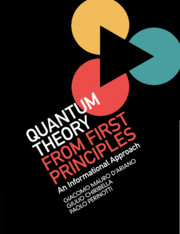Book contents
- Frontmatter
- Dedication
- Contents
- Preface
- Acknowledgments
- 1 Introduction
- Part I The Status Quo
- Part II The Informational Approach
- 3 The Framework
- 4 The New Principles
- 5 Causal Theories
- 6 Theories with Local Discriminability
- 7 The Purification Principle
- Part III Quantum InformationWithout Hilbert Spaces
- Part IV Quantum Theory from the Principles
- References
- Index
4 - The New Principles
from Part II - The Informational Approach
Published online by Cambridge University Press: 09 February 2017
- Frontmatter
- Dedication
- Contents
- Preface
- Acknowledgments
- 1 Introduction
- Part I The Status Quo
- Part II The Informational Approach
- 3 The Framework
- 4 The New Principles
- 5 Causal Theories
- 6 Theories with Local Discriminability
- 7 The Purification Principle
- Part III Quantum InformationWithout Hilbert Spaces
- Part IV Quantum Theory from the Principles
- References
- Index
Summary
In this chapter we provide an overview of the new principles used for reconstructing quantum theory. We have already seen the principles in Chapter 2, where they have been derived as theorems of the quantum theory. In Part IV of this book we will actually do the reverse process, namely to derive quantum theory from the principles. All features of quantum theory – ranging from the superposition principle, entanglement, no cloning, teleportation, Bell's inequalities violation, quantum cryptography – can be understood and proved using only the principles, without using Hilbert spaces, and this is indeed the aim of Part III of the book, whereas Part IV contains the derivation of the theory from the principles.
All the six principles are operational, in that they stipulate whether or not certain tasks can be accomplished: they set the rules of the game for all the experiments and all the protocols that can be carried out in the theory. They also provide a great insight into the worldview at which quantum theory hints.
We review the list of the principles:
1. Atomicity of composition
2. Perfect discriminability
3. Ideal compression
4. Causality
5. Local discriminability
6. Purification
All six principles, with the exception of purification, express standard features that are shared by both classical and quantum theory. The principle of purification picks up uniquely quantum theory among the theories allowed by the first five, partly explaining the magic of quantum information.
The principles of causality, local discriminability, and purification will be thoroughly analyzed in Chapters 5, 6, and 7, respectively. The other three principles, atomicity of composition, perfect discriminability, ideal compression, are examined in the remainder of the present chapter.
Atomicity of Composition
In the general framework we encountered the notions of coarse-grained and atomic operation. A coarse-grained operation is obtained by joining together outcomes of a test, corresponding to neglect some information. The inverse process of coarse-graining is that of refining. An atomic operation is one where no information has been neglected, namely an operation that cannot be refined. When the operation is atomic, the experimenter has maximal knowledge of what's happening in the lab. A test consisting of atomic operations represents the highest level of control achievable according to our theory. But, is it possible to maintain such a level of control throughout a sequence of experiments?
- Type
- Chapter
- Information
- Quantum Theory from First PrinciplesAn Informational Approach, pp. 130 - 138Publisher: Cambridge University PressPrint publication year: 2017



